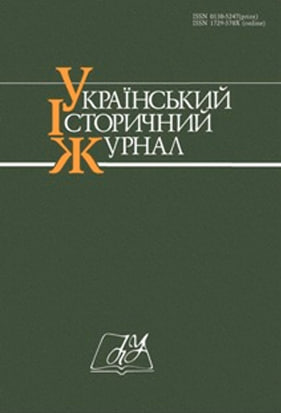Projections of Ukrainian Independence from Russia in the Light of the Conceptualizations of Leading German Intellectuals from the End of the Nineteenth Century Until 1918
DOI:
https://doi.org/10.15407/uhj2025.01.121Keywords:
German intellectual history, generations of German intellectuals, geopolitics, historiosophy, independence from Russia, grounds and prerequisites for independence, ways and means of gaining independenceAbstract
The purpose is to consider comprehensively the set of research ideas of a number of German intellectuals from the end of the 19th century until 1918 about grounds of Ukrainian independence with the derivation of reasoning about the ways and means of its achievement.
The methodology is based on the implementation of the teaching of the sociologist K. Mannheim about generations and the ideas of the historian R. Chartier about the different articulation of the series of discourses on the basis of which social and intellectual positions are organized in society.
Scientific novelty. For the first time, a holistic, comprehensive understanding of the ideas and concepts of German intellectuals revealed by the author in the sources regarding the possible projections of Ukrainian independence is presented, with their wide comparative analysis. In contrast to previous researchers, the author shows the vision of a group of German intellectuals and singles out in them the tendencies that have emerged in German science regarding the problem of Ukraine’s independence.
Conclusions. The author singles out and examines two trends in German intellectual history at the time: historiosophical, represented by E. von Hartmann, O. Hoetzsch, and P. Rohrbach, and geopolitical, represented by F. Naumann, A. Penck, and M. Weber. Their views formed a separate discourse of Ukrainian independence within each direction, where they discussed different opportunities for Ukraine to gain independence and put forward different visions of the ways and means of achieving it. In addition to the identical conceptual conclusions of each author concerning the statements about the possibility of Ukraine becoming an independent nation and state, the author formulates existing differences. In the context of the discussion of the reasons and grounds for Ukrainian independence, historians put forward a civilizational conceptualization (socio-cultural differences) and a cultural one (superiority/inferiority/growth/decline). Geopoliticians adhered to geopolitical conceptualization (self-sufficiency of spatial location). Regarding the aspect of defining the possible ways and means of gaining independence, geopolitics identified several associations of European states as allies of Ukraine on this path or the creation of a buffer state on the border with Russia, similar to the Tsardom of Bulgaria. Historians suggested either the Kingdom of Romania or Poland and Finland as allies of Ukraine on the way to independence.


